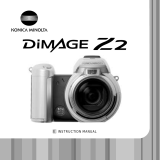9
8
Table of contents
Quick start check list .............................................................................................................................2
Before you begin....................................................................................................................................3
For proper and safe use ........................................................................................................................4
Names of parts ...................................................................................................................................14
Camera body...........................................................................................................................14
Recording mode display .........................................................................................................16
Viewfinder................................................................................................................................17
Getting up and running........................................................................................................................18
Attaching and removing a lens ..............................................................................................18
Attaching the camera strap.....................................................................................................19
Diopter adjustment..................................................................................................................19
Charging the battery................................................................................................................20
Installing and changing the battery.........................................................................................21
Turning on the camera ............................................................................................................22
AC Adapter AC-11 (sold separately).......................................................................................22
Battery condition indicator......................................................................................................23
Auto power save .....................................................................................................................23
Inserting and changing a memory card ..................................................................................24
Setting the date and time........................................................................................................26
Basic recording ...................................................................................................................................27
Setting the camera to record images automatically ...............................................................27
Handling the camera...............................................................................................................27
Basic recording display...........................................................................................................27
Basic recording operation .......................................................................................................28
Focus signals ..........................................................................................................................29
Special focusing situations .....................................................................................................29
Focus lock...............................................................................................................................30
Camera-shake warning ...........................................................................................................30
Using the built-in flash ............................................................................................................31
Anti-Shake system ..................................................................................................................32
Display button .........................................................................................................................33
Basic playback ....................................................................................................................................34
Viewing images .......................................................................................................................34
Rotating images ......................................................................................................................34
Histogram display ...................................................................................................................35
Deleting single images ............................................................................................................36
Changing the playback display...............................................................................................37
Enlarged playback...................................................................................................................38
TABLE OF CONTENTS
Advanced recording.............................................................................................................................39
Exposure-mode dial ................................................................................................................39
Digital Subject Programs............................................................................................40
Auto Recording...........................................................................................................41
Program - P ................................................................................................................41
Aperture priority - A....................................................................................................42
Shutter priority - S......................................................................................................42
Exposure control range warnings...............................................................................43
Manual exposure - M .................................................................................................44
Bulb exposures...........................................................................................................45
Exposure lock - AEL button ....................................................................................................46
Slow sync. ...............................................................................................................................47
Spot AF button........................................................................................................................47
Exposure compensation..........................................................................................................48
Depth-of-field preview.............................................................................................................49
AF / MF switch ........................................................................................................................49
Drive modes ............................................................................................................................50
Continuous-advance notes ........................................................................................51
Self-timer notes ..........................................................................................................51
Exposure bracketing notes.........................................................................................52
White-balance bracketing notes ................................................................................53
Camera sensitivity (ISO) and Zone Matching..........................................................................54
Camera sensitivity and flash range.........................................................................................55
Function button .......................................................................................................................56
AF area .......................................................................................................................57
AF modes ...................................................................................................................58
Metering modes..........................................................................................................59
Flash compensation ...................................................................................................60
Color mode.................................................................................................................61
Digital Effects Control (DEC) ......................................................................................63
White balance..........................................................................................................................64
AWB - Auto White Balance ........................................................................................64
Preset white balance ..................................................................................................65
Custom white balance................................................................................................66
Color temperature.......................................................................................................67
A short guide to photography..............................................................................................................68
Light sources and color...........................................................................................................69
What is an Ev? ........................................................................................................................69






















